[Dec 2007, Volume 4 Quarterly Issue] Pdf File size - The IIPM Think ...
[Dec 2007, Volume 4 Quarterly Issue] Pdf File size - The IIPM Think ...
[Dec 2007, Volume 4 Quarterly Issue] Pdf File size - The IIPM Think ...
Create successful ePaper yourself
Turn your PDF publications into a flip-book with our unique Google optimized e-Paper software.
REIMAGINING INDIA<br />
and South-East Asia to make the correct<br />
conclusions about the role of state and<br />
markets and to have the pragmatic approach<br />
to use both. Instead what we have<br />
today is simplistic journalistic comparisons<br />
to other economies and often to<br />
only advance the point that in other cases<br />
cited, they have been more market<br />
friendly than the Indian state has been.<br />
What one witnesses, especially in the<br />
popular press and in TV business programmes,<br />
are almost illiterate comparisons<br />
by journalists to other countries and<br />
societies in East and South-East Asia<br />
without any reference to their history or<br />
a deeper understanding of these societies.<br />
<strong>The</strong> comparisons are like frozen in<br />
time and are snapshots of the present<br />
without any reference to how they have<br />
come there. Unfortunately academics<br />
also, instead of making up for their lack<br />
of knowledge of Asian societies, in an<br />
incestuous manner quote these journalistic<br />
comparisons when for example there<br />
is opposition to the entry of TNCs to the<br />
retail trade or to the coercive attempts to<br />
deprive people of their land and force<br />
SEZs down the throat of unsuspecting<br />
citizens. In contrast what we seriously<br />
and urgently need is the building of institutional<br />
capacity to study comparative<br />
development between India and other<br />
developing countries especially in the<br />
Asia and Pacific region and focused on<br />
different aspects of economy, society,<br />
social policy and in general the shaping<br />
of public policy. In a sense the old institutional<br />
arrangements that exist in most<br />
of our universities in the form of area<br />
studies and associated centres and departments<br />
may have to be revisited and<br />
both existing capacity strengthened as<br />
well as new capacity created.<br />
An important dimension of generating<br />
knowledge on comparative development<br />
is to link with governance and understanding<br />
governance related issues. Keeping<br />
in line with what has been said earlier<br />
in this paper about the centrality of governance<br />
to ensure growth that can be socially,<br />
culturally and ecologically sustained,<br />
research and studies need to be<br />
done not only comparing India and Asian<br />
countries but also comparisons within<br />
India between regions and states. Keynes<br />
had held that, “the theory of economics<br />
does not furnish a body of settled conclusions<br />
immediately applicable to policy<br />
Unfortunately academics, instead of making up for their<br />
lack of knowledge of Asian societies, in an incestuous<br />
manner quote journalistic simplistic comparisons down the<br />
throat of unsuspecting citizens<br />
and it is a method rather than a doctrine,<br />
an apparatus of the mind, a technique of<br />
thinking”. Comparative development, in<br />
contemporary times, almost two decades<br />
after the emergence of globalization, is “a<br />
technique of thinking’. Keynes was only<br />
echoing Marshall who in his Principle of<br />
Economics had long ago held the view,<br />
“economics is not a body of concrete<br />
wealth but an engine for the discovery of<br />
concrete truth”. Economists and social<br />
scientists in our country have much work<br />
to do to study and learn from other societies<br />
and in order to ensure that economic<br />
progress and development in our country,<br />
means a full human life for all our citizens<br />
not a situation of vulgar wealth mocking<br />
the inhuman conditions of existence that<br />
is the day to day reality for a very large<br />
number of our citizens. Only then India<br />
will be truly and respected for its greatness<br />
and the extraordinary cultural and<br />
philosophical wealth that it possesses.<br />
Otherwise, we will continued to be seen<br />
as a nation of hypocrites (even if no one<br />
for politeness does not say this to our face)<br />
and no amount of nationalistic jingoism<br />
and fanatical cultural nationalism will<br />
change our image or the situation we are<br />
in as a nation. It is therefore time that<br />
middle class intelligentsia, academics and<br />
intellectuals in India came to grips with<br />
this reality than delude themselves with<br />
false images of greatness.<br />
References<br />
• Sukhamoy Chakravarty, ‘Writings on<br />
Development, with an Introduction by<br />
Mihir Rakshit’, Oxford University<br />
Press, Delhi, 1997<br />
• Dreze, Jean and Amartya Sen, ‘India:<br />
Economic Development and Social<br />
Opportunity’, Oxford University Press,<br />
Delhi, 1995<br />
• Dreze, Jean and Amartya Sen (eds),<br />
‘Indian Development: Regional Perspectives’,<br />
Oxford University Press,<br />
Delhi, 1996<br />
• Amartya Sen, ‘<strong>The</strong>ory and Practice of<br />
Development’, in ‘Indias economic Reforms<br />
and Development-Essays for<br />
Manmohan Singh’, Isher Judge Ahluwalia<br />
and I.M.D.Little (eds), Oxford<br />
University Press, 1998<br />
• Amaresh Bagchi, ‘Role of Planning and<br />
the Planning Commission in the New<br />
Indian Economy: case for a Review’,<br />
Economic and Political Weekly, Bombay,<br />
November 3, <strong>2007</strong>.<br />
22 THE <strong>IIPM</strong> THINK TANK


![[Dec 2007, Volume 4 Quarterly Issue] Pdf File size - The IIPM Think ...](https://img.yumpu.com/29766298/21/500x640/dec-2007-volume-4-quarterly-issue-pdf-file-size-the-iipm-think-.jpg)
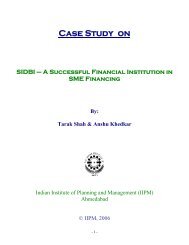
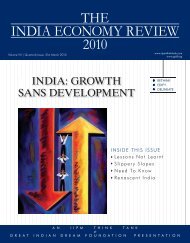
![[Feb 2008, Volume V Annual Issue] Pdf File size - The IIPM Think Tank](https://img.yumpu.com/43961117/1/190x245/feb-2008-volume-v-annual-issue-pdf-file-size-the-iipm-think-tank.jpg?quality=85)
![[June 2008, Volume V Quarterly Issue] Pdf File size - The IIPM Think ...](https://img.yumpu.com/41693247/1/190x245/june-2008-volume-v-quarterly-issue-pdf-file-size-the-iipm-think-.jpg?quality=85)
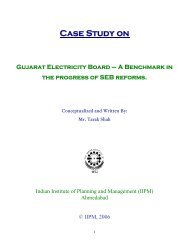
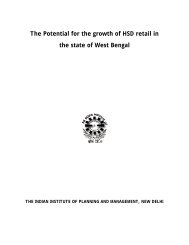
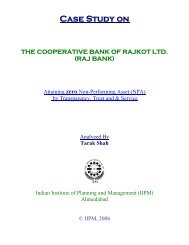
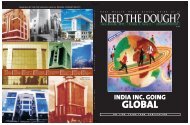
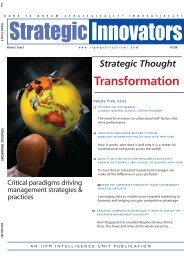
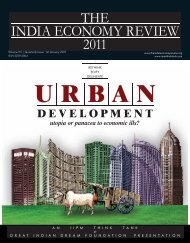
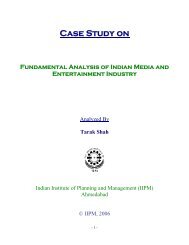
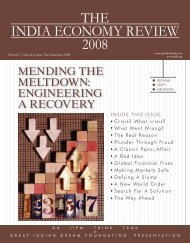
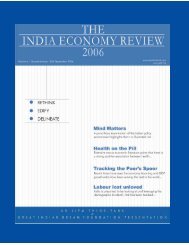
![[Volume VI | Quarterly Issue: 31st May 2009] Pdf File size](https://img.yumpu.com/27796051/1/190x245/volume-vi-quarterly-issue-31st-may-2009-pdf-file-size.jpg?quality=85)